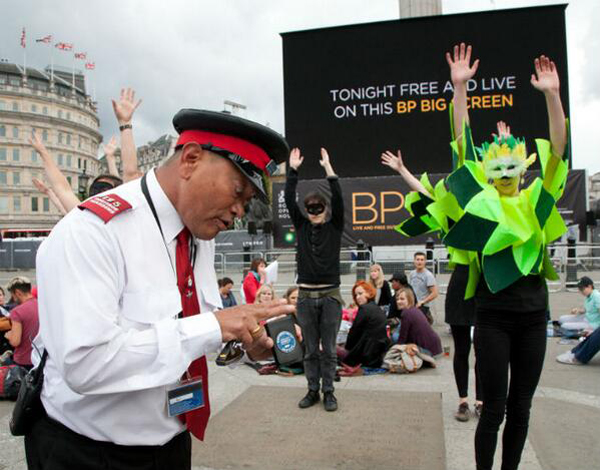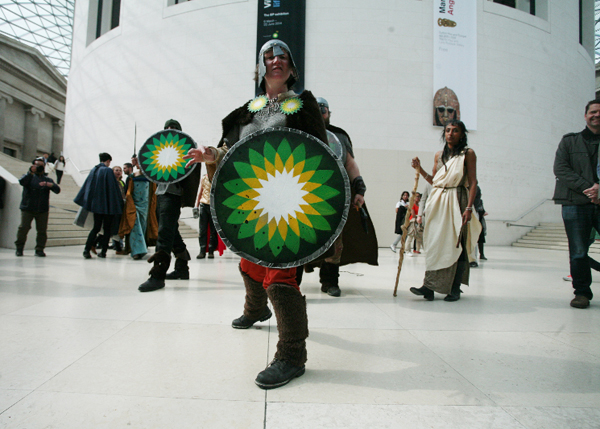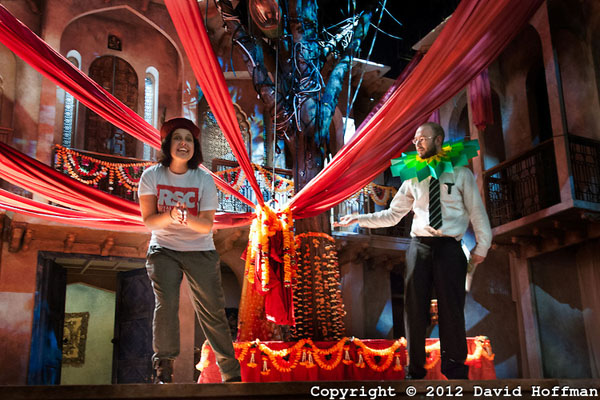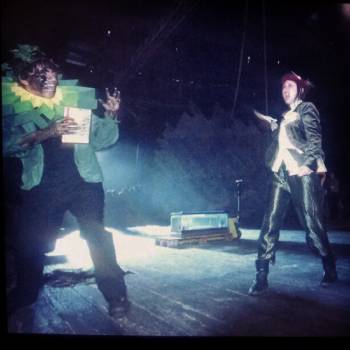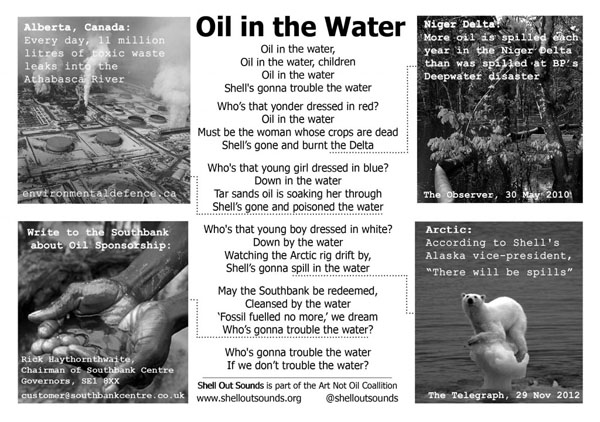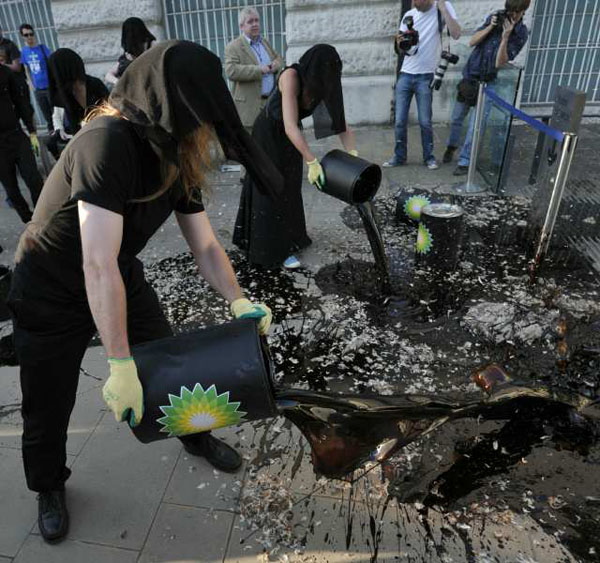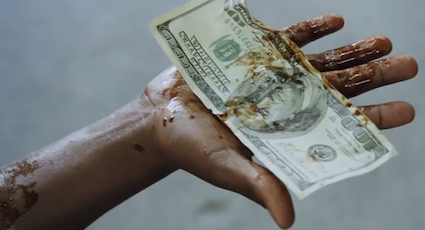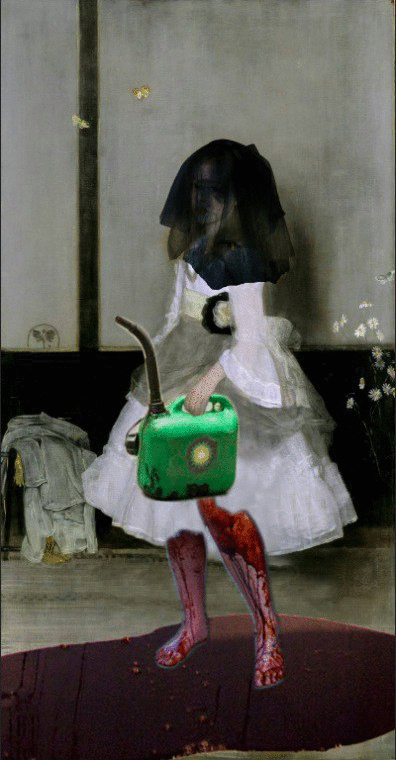This article is from our associated project, CreativeResistance.org
On May 20, 2014, BP Out of Opera performed a ‘flash dance’ just before the screening of a BP-sponsored performance of the Royal Opera House’s La Traviata. The group objects to BP sponsorship of the arts, joining a growing chorus of artists, actors and dancers who are acting out to bring attention to the oil money that is seeping into the art world as BP and other big oil companies attempt to greenwash their image by funding cultural events.
A troupe of dancers took center stage at an outdoor screening before the opera began. In a video of the dancers performance,the opera’s boldly lettered “BP Big Screens” banner provides the backdrop behind the dancers. The three minute piece uses movement to communicate a power struggle between citizens and two characters representing BP who are adorned in BP logo-shawls.
This flashy logo, with its rings of green and yellow diamonds, has provided much opportunity to costumers in this movement. Nice of BP to create such a pretty design for artists to riff on.
The logo served as circular shields for BP Vikings who invaded the British Museum last month to protest BP sponsorship of the popular Vikings exhibition.
In the case of this latest performance the logo-decorated costume piece ended up at the center of a tug-of-war between artists and security guards.
At the end of the routine the dancers do finally succeed in pulling the BP shawls off the villains then throw the costumes on the ground and begin to stomp. At this point an opera security guard seems to mistake the company logo for a sacred symbol and he snatches the piece of costume off the ground. The dancers succeed in liberating their personal property and end the show to audience applause.
The BP logo has also festooned a Shakespearian costume in the form of an elegant neck ruff in a Reclaim Shakespeare performance when actor-vists took the stage to rail in verse against BPs incursion into the Royal Shakespeare Company.
Reclaim Shakespeare Company has on several occasions stepped in front of the audience before a show to present their grievances against oil money in the arts.
On June 27, 2012, three Reclaim Shakespeare Company actor-vists took unexpectedly to the stage at the Roundhouse Theatre in Camden to perform a three-minute sketch inspired by The Comedy of Errors, in which the narrator first meets a ‘fine and worthy’ patron of the arts, and then meets a ‘noxious, treach’rous, belching, oily rogue’ – who turn out to both be the same character, BP (sporting the logo ruff). On discovering this, BP is accused of ‘taking fair nature as his green-tinged guise’ whilst ‘with daring folly [he] burns the world.’
The performance culminated with a call to action: ‘Enough! No more! / Now is the summer of our discontent. / Out, damn logo!’, with the narrator ripping the BP logo from her theatre programme. The audience were then encouraged to do the same.
As stated by Danny Chivers, one of the players:
“Times are tough. Ay, there’s the rub. But all that glisters is not gold. And whilst comparisons are odorous, we do well remember the dropping of tobacco companies as sponsors by a host of cultural institutions.
The arts continued, and so shall the RSC, freed from the grasp of this smiling damned villain. Once more unto the breach, dear friends, once more!”
A Tangled Web of Actor-vists and Artists
The arts groups which have sprung into action to call attention to the oil industy invasion of arts and culture are numerous and interconnected. The Reclaim Shakespeare Company and Shell Out Sounds is part of an umbrella group called the Art Not Oil Coalition, and they work alongside other anti-oil sponsorship groups such as Liberate Tate, Platform, UK Tar Sands Network, Rising Tide UK and Science Unstained.
Platform combines art, activism, education and research in one organisation, creating unique projects driven by the need for social and ecological justice. “Art can do things that information can’t.” Reads the website “Art takes our mind to new places, reaches our heart, and draws on our gut feelings…We and the artists we work with open up spaces for transformation, inspiration and change…Platform performs and exhibits in whatever spaces serve the needs of the project: a field, the street, along a river or an office block. Platform’s work has also taken place in cultural venues…”
July 18 2011, Reverend Billy Talen lead a mass exorcism in Tate Modern Turbine Hall over ‘taint’ of BP sponsorship with the help of five different UK-based groups – Liberate Tate, UK Tar Sands Network, London Rising Tide, Art Not Oil and Climate Rush
A Prolific Body of Work
The number of creative actions, performances and performance art pieces is too high to include here and we can’t do justice to the prolific vibrancy of this performance movement for ecological and social justice. I’ll include a few, but please explore the links to see more.
BP Or Not BP has created a page highlighting performances and films, with a news story timeline.
Tate á Tate maintains a Facebook page: End oil-sponsorship of the arts, which gathers stories and updates about this movement.
From the page description: “Little more than a decade ago, tobacco companies were seen as respectable partners for public institutions to gain support from – that is no longer the case. It is our hope that oil and gas will soon be seen in the same light. The public is rapidly coming to recognise that the sponsorship programmes of BP and Shell are means by which attention can be distracted from their impacts on human rights, the environment and the global climate.”
Let’s not leave Shell out of the picture, and the joyful, thoughtful work of Shell Out Sounds, seen here singing and speaking out for their Carols Not Barrels project, Christmas 2013.
A few months prior, on September 13, 2013, just as a Shell-sponsored performance by the Sao Paolo Symphony Orchestra was about to start, a 15-strong Shell Out Sounds choir suddenly stood up in their seats behind the stage, in full view of the audience, and began to sing. They launched into a version of the classic spiritual Wade in the Water, with rewritten lyrics drawing attention to Shell’s controversial human rights and environmental record.
Visual and performance artists are pitching in too.
a group called the Good Crude Britannia, demanding that London’s Tate Britain cut its ties with BP, used a substance resembling oil to stage a mock spill, then covered the scene with bird-like feathers.
Human Cost, a performance art piece using charcoal, sunflower oil and a male nude took place at Tate Britain on the first anniversary of the start of the BP Gulf of Mexico disaster. It lasted for 87 minutes, one for every day of the spill.
Artists are venturing forth from centers of art and entering the halls of business as well. On May 12, a Reclaim Shakespeare player stood up in the British Gas shareholder meeting, clutching a tin of beans and a skull. He performed a Hamlet-inspired soliloquy about fuel, poverty and climate change:
“To heat or not to heat — that is the question:
Whether ‘tis nobler in the mind to suffer
The cold and hunger borne from your outrageous fortune
Or to raise arms against the slew of price hikes
And by opposing end them. To die, to sleep –
Perchance to dream
But what dreams can be had in a frozen bed
And die we would not – though
Ten thousand died in this year past
For poverty of fuel. And across the globe,
Many more have shuffled off this mortal coil
In drought, in flood, in failing harvests, rising tides,
Tides unnatural, made by the artifice of men
Who care only for profit. Aye, there’s the rub.
Do we not have a right to heat AND to eat
Do we not have a right to energy that is cleaner and greener
And cheaper, free from the profiteering
Of this odious corporation
British Gas, in thy orations may thy sins be remembered
Shareholders, this only: to thine own self be true.”
This action was part of a wider protest against the climate-trashing profiteering of British Gas, alongside Fuel Poverty Action, 350.org, UK Uncut, DPAC (Disabled People Against Cuts), No Dash for Gas and many others. #BinBritishGas!
Seemingly Ubiquitous Oil Slick Oozing Through Arts and Culture
The list of ways in which big oil has bought-out the cultural sphere worldwide is also too long to include here. Just for a start:
“The BP Walk through British Art offers a circuit of Tate Britain’s unparalleled collection from its beginnings to its end” reads the website from the Tate Gallery.
The British Museum is currently showing “The BP exhibition Vikings Life and Legend.”
BP sponsors the Royal Shakespeare Co, and the World Shakespeare Festival. Mark Rylance, one of the UK’s leading actors, who performed in the Olympic opening ceremony, expressed his concerns about BP’s sponsorship of the Olympics and the Cultural Olympiad (of which the World Shakespeare Festival is part.)
Last week it was announced that the Natural History Museum’s main hall would be renamed the Hintze Hall in recognition of a £5 million gift from British-Australian businessman and philanthropist Sir Michael Hintze. Sir Michael Hintze, is the man who, in 2012, was revealed as a backer of the Global Warming Policy Foundation, an organization that regularly casts doubt on the science and cost of tackling climate change.
The Museum of Civilisation, in Gatineau, Quebec announced it had struck a sponsorship deal with the Canadian Association of Petroleum Producers. The museum holds a similar position to the British Museum in London, housing the stolen riches of the British Empire, but in its case it houses artworks and objects of cultural significance to First Nations, in two of its major exhibitions, presenting a sanitised version of colonisation.
The Museum represents one way in which the Canadian state attempts to historicise the cultures of First Peoples at the same time as withdrawing rights or reneging on agreements with First Nations.
The Museum has been the location of numerous Idle No More events and protests in defense of First Nations constitutional rights, including this recent ceremony held as an intervention in the gallery to mark the 250th anniversary of the Royal Proclamation, CAPP and associated Canadian oil sponsors of the arts Imperial Oil were found to have been pressurising another Canadian museum to withdraw content from their exhibits that they found too critical of Big Oil. (See the Platform Blog for more)
But Wait, What’s the Problem With Big Oil Funding Arts and Culture?
In What does the backlash over the Sydney Biennale sponsorship controversy say about the art world? on the Platform Blog, Dr Alana Jelinek writes:
“The public-private funding model fosters not the philanthropic gestures that rhetoric around the model implies, nor does the public-private model serve as a continuation of previous governments’ arm’s length model of support for the arts. Instead contemporary forms of public-private sponsorship of the arts must be understood as the opportunity for strategic marketing campaigns for those types of corporation in need of the cultural capital of highly prestigious internationally-regarded arts venues and events.”
The issue spans the spectrum of environmental and human rights concerns. Platform has been considering this question and developing a response for decades, and there is much written on their site for those who wish to seriously consider the ramifications of our current private-public funding systems.
A PDF of their publication Not If but When: Culture Beyond Oil can be downloaded here.
How could these corporations think they could possibly mess with artists?
We live and breathe creativity, drive, passion and exuberant self-expression, and we cultivate the skills it takes to make a splash and have an impact on the world. Artists are the storytellers. Whether we use words, music or visual arts, we spin the yarn that tells our human story.
And humans are storytelling creatures, dependent upon story to interpret the chaos of our world and find our place, our sense of belonging. It’s inevitable that humans will be enchanted by the songs of the artists and come to find their identity and belonging with this community of people who takes risks and makes noise and dares to be beautiful and strange and funny. We will prevail!
Culture is the life of the people, it belongs to the grass roots, to the deep waters which seem invisible to the money interests, who know only the shallows, who try to control what can not be controlled.
I ask these money people do you really want to go up against those who have chaos on their side, who are fed and driven by an internal spring of inspiration that never runs dry? You will become our collaborators as we turn each new incursion into a stage setting for our creative process. We thrive on identifying challenges and limitations and using the resources at hand. The world you are trying to buy and build will only be the raw material for an endless stream of dramatic, daring, joyful and visionary gestures in our continuing, cooperative, world-creating, story-making project.
Tate held a “GIF party” – and Liberate Tate’s GIFs were noticeably the life and soul. After receiving an open invitation from Tate to submit GIFs for its mass participatory GIF animation collage installation they sent in 16 to be displayed. See more!


